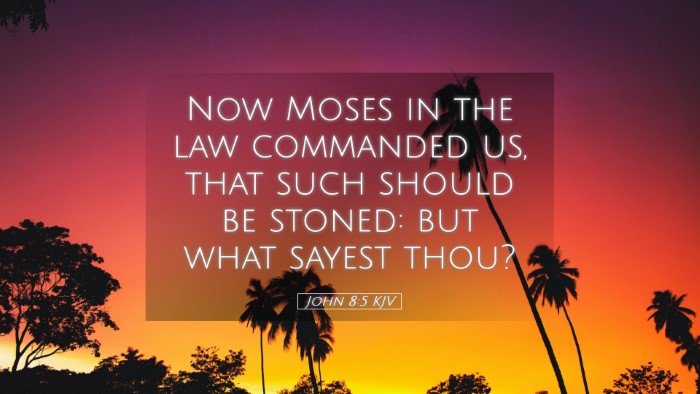Commentary on John 8:5
In John 8:5, we encounter a significant moment in the narrative of Jesus' ministry, which reflects the tension between the law and grace. The verse reads:
"Now Moses in the law commanded us, that such should be stoned: but what sayest thou?"
This inquiry arises from the context of the Pharisees bringing a woman taken in adultery before Jesus, seeking to trap Him in His response. The implications of this verse are profound, and a careful examination reveals insights that are invaluable for pastors, students, theologians, and Bible scholars alike.
Historical Context
The Pharisees' question is deeply rooted in the Mosaic Law. In Leviticus 20:10 and Deuteronomy 22:22, we find the commands concerning adultery, indicating the serious nature of the sin and its consequences. It is crucial to understand that the Pharisees were not merely interested in justice but were also attempting to ensnare Jesus in a legalistic trap.
Commentary Insights
-
Matthew Henry:
Henry reflects on the Pharisees' ulterior motives; they sought to discredit Jesus as a teacher of the Law by pitting His compassion against the stipulations of the Law. Henry emphasizes the importance of mercy and the heart of the Law over mere legalism.
-
Albert Barnes:
Barnes points out that the question they posed was an attempt to create a dichotomy between Jesus’ role as a prophet and His fulfillment of the Law. He notes that the Law demanded justice, yet Jesus demonstrated a higher order of grace and truth, presenting a nuanced understanding of righteousness.
-
Adam Clarke:
Clarke elaborates on the importance of the setting and the motivations of the accusers. He indicates that the woman taken in adultery symbolizes humanity's need for redemption, and Jesus' response is a precursor to the Gospel's message of forgiveness and restoration, which transcends judgment.
Theological Implications
The interplay between law and grace is foundational to Christian theology, and John 8:5 presents a profound teaching moment. It showcases the challenge of interpreting the Law in light of Jesus’ mission. Here are key theological implications derived from the verse:
- Law vs. Grace: The Pharisees represented a tradition fixated on legal adherence, while Jesus embodied the grace that fulfills the law. This distinction is crucial for understanding how Christians are to approach the Law.
- Human Dignity: In their eagerness to execute justice, the Pharisees neglected the woman’s dignity and humanity. Jesus' eventual treatment of her underscores the value placed on the individual soul.
- Judgment and Mercy: The incident sheds light on the balance of judgment and mercy. While the text affirms the seriousness of sin, it also emphasizes the possibility of redemption and forgiveness through Christ.
Application for Today
For contemporary readers, John 8:5 invites a reflective examination of how we approach others caught in sin. Are we quick to emphasize legalistic judgments at the expense of mercy? The following applications are pertinent:
- Resisting Legalism: The Church is called to move beyond simple legalism to a deeper understanding of grace that seeks to restore rather than condemn.
- Emphasizing Restoration: There should be an active effort to bring those who have fallen into sin back to a place of restoration. Jesus’ model provides a framework for how to deal with moral failures within the community.
- Pursuing Justice with Mercy: As followers of Christ, the juxtaposition of justice and mercy must guide our interactions and decisions, reflecting the character of Christ in our dealings with others.
Conclusion
In conclusion, John 8:5 serves as a critical intersection of law and grace, shedding light on the character of Jesus as the embodiment of God's mercy while upholding the truth of the Law. By exploring these insights from historical and theological perspectives, we gain a richer understanding of how to apply these truths in our lives and ministries. The challenges posed by the Pharisees remind us that our call as Christians is not only to adhere to the truth but also to extend the grace that has been given to us through Christ.


